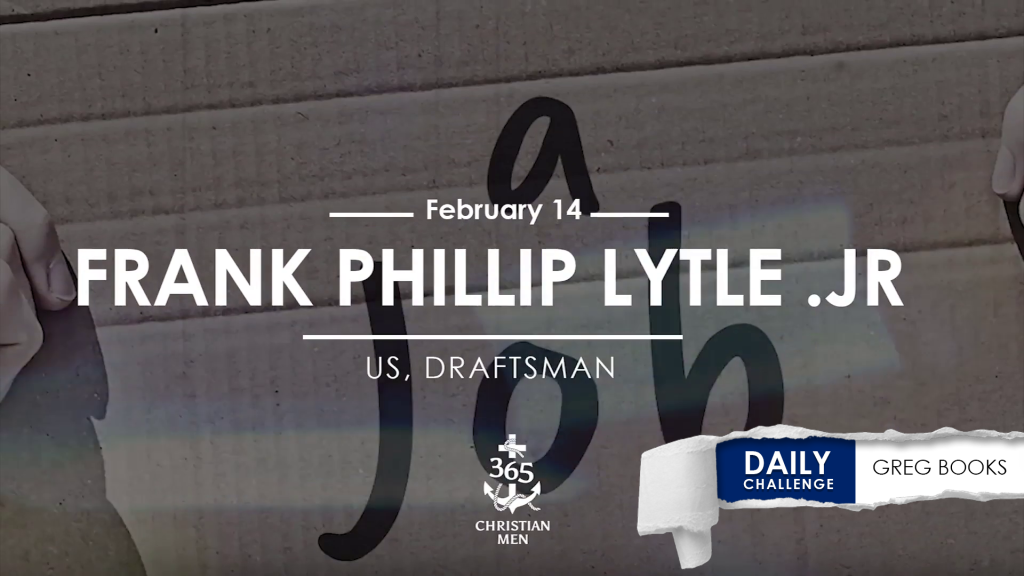February 14. Frank P. Lytle, Jr. Although he lost his hearing when he was one, “Frank was a follower of Jesus and a leader of men.” So reads a line on Abilene Christian University’s webpage for the Frank & Lois Lytle Family Endowed Scholarship—which Frank’s son created out of deep respect for his parents.
Frank served as a church deacon and in many deaf ministries. He was “always ‘out in front’ leading in deaf organizations throughout Michigan and Arizona.” Seems Frank has always had the drive to see what needed to be done and to do it. Listen to this.
Success is for those who refuse to quit.
Thirteen-year-old Frank squirmed in his seat and glanced—again—toward the door. He and his buddies at Detroit Day School for the Deaf eagerly anticipated the arrival of Henry Ford.
Finally, in strode the great car manufacturer. He wore a dark suit, sharp tie, and pressed white shirt.
Impressive. Mr. Ford spoke, and Frank tried to read his lips. Had he understood? The interpreter signed, “If you graduate from this school, come down to the factory, and I’ll give you a job.”
It was true. Mr. Ford had promised him a job. In 1934, a lot of people said the deaf were unemployable, but God had given him the ability to learn—and to work hard. One day he would take Ford’s offer.
Four years later, the World Headquarters of Ford Motor Company loomed above seventeen-year-old Frank. On his pants, he wiped sweaty palms. His mother nodded encouragement. They entered the employment office, and Frank’s mother helped him communicate his desire for a job. The company hired Frank—at a good wage—as an apprentice-journeyman in Tool and Die.
As Frank left, he barely felt the floor beneath his feet. He had a man’s job.
Frank was happy working in the factory—but he wanted to become a white-collar office worker. Blue-collar workers endured all kinds of shifts—day and night. But on the evening of his old school’s skating party, he was free to attend. Up walked Lois, the prettiest gal ever. Skating with her on his arm, Frank’s dreams gelled. He would find a path to a white-collar job. Then he would marry Lois. A family man needed better pay and hours.
To go from blue-collar to white-collar work was always a leap—but it was unheard of for a man who was deaf. Still, Frank enrolled in classes to become a draftsman.
The first day of class, Frank worked at the factory. Then he went to school and took a seat with a clear view of the teacher. But as the teacher wrote on the chalkboard, the man kept facing the wall when he talked.
Frank couldn’t read his lips. Frank copied everything on the board but didn’t understand all of it. After class, he asked the teacher for an explanation, but the teacher didn’t help.
Frank’s shoulders sagged, but he refused to quit. For four years he worked his factory shift and then sat in class, copied the board, and wondered what the others heard. Then Frank took the exam to certify as a draftsman. Frank failed.
Frank’s dream shattered. But his mother marched him back to the drafting class. He enrolled for another year, and this time, the new teacher was more helpful. Once again Frank took the certification exam. He passed—and was promoted to draftsman.
His first day, Frank strode into Ford World Headquarters in his dark suit, sharp tie, and pressed white shirt. Head high—but pulse sputtering like a poorly tuned engine—he sat at the long table covered in rolls of wide, white paper.
The boss handed Frank a note. “Heard your story,” it said. “Wonderful story. I will give you two weeks, and we will see if it works out.”
Frank limbs went limp. After five years of sacrifice, constant struggle, and dogged perseverance, could the dream again be stripped away?
The two weeks dragged. At the end of them, the boss gave Frank a “thumbs up.”
The first deaf man to obtain a white-collar job at Ford, Frank designed and built engines for forty-two and a half years. Before he retired, he managed a team of twenty-six.
“Dad acted with the strength given by God to overcome all the challenges of being a fully deaf boy in a hearing world,” Rick Lytle, Frank’s son, said.
Frank’s success brought hope to the deaf community. He encouraged his friends to pursue career advancement. And several did. They created a standard of living that—for the deaf of their time—was unprecedented.
“Like us, [Dad] didn’t know … how God was working behind the scenes,” said Rick. But “Dad acted in simple faith, goodness, and hard work.” God multiplied Frank’s efforts and “blessed many lives.”
“I have set the LORD always before me. Because he is at my right hand, I will not be shaken” (Psalm 16:8 BSB).
How do you face overwhelming odds? Success is for those who refuse to quit.
Based on an interview with Rick Lytle, Frank Lytle’s son on November 5, 2019.
“Frank & Lois Lytle Family Endowed Scholarship.” Accessed October 1, 2020. Abilene Christian University. https://acu.academicworks.com/opportunities/2592.
Story read by Blake Mattocks





